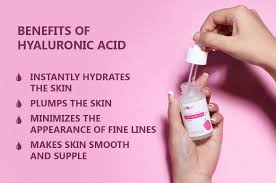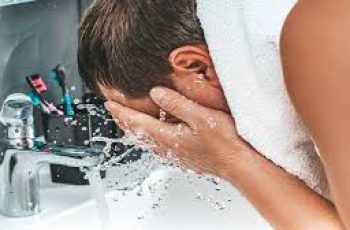
Skincare Benefits of Hyaluronic Acid- Why is Hyaluronic Acid Good for Skin?
If you have kept up to date with our previous posts, the word “acid” will no longer fill you with images of something scary! In fact, you’ll know that using AHA and BHA in your daily skincare routine will work at giving you a healthy, youthful, glowing complexion. So today I thought I’d share with you some information about one of the most popular acids available on the market, hyaluronic acid. This supercharged, moisture-enhancing facial acid is truly remarkable with no other AHA having the ability to deliver outstanding results as Hyaluronic.
So, read on to find out more about this wonderous, and slightly genius AHA and the difference it can make to your skin.
What Is Hyaluronic Acid
Hyaluronic acid is naturally produced in the body to maintain the moisture levels in the skin, keeping its barrier functioning properly. The acid is also called a humectant, which is a substance used to reduce the loss of moisture. There is, however, some trouble as it encounters daily aggressors, such as pollution and the environment making the moisture levels dip at a rate too quickly for the body to maintain, usually resulting in skin irritation. The way it works is like a magnet, keeping the cells of the skin retaining as much water as possible, 1 single gram of hyaluronic acid holds up to 6 litres of water, great for your thirsty skin.
When all this is working your skin is hydrated, plumper, healthier and firmer-looking. You also don’t need to worry about these skin cells retaining too much water, as this clever AHA can regulate the amount within the cells, stopping them from drowning, now you know why it’s described as a genius!
Hyaluronic acid can be manufactured in many different ways, such as synthetically and naturally from plants and fermented wheat which extracts the hyaluronic acid present in wheat resulting in a completely naturally derived acid. No matter the way it is produced, the structure remains the same with incredible hydrating properties improving the overall complexion, such as reducing the appearance of fine lines and wrinkles and calming any skin irritation and dehydration.
How Does Hyaluronic Acid Work?
Hyaluronic acid is a natural compound in the body that over time, as we age, its production and ability to keep up wavers, with the levels depleting and loss of moisture resulting in our skin become parched, rigid and lined. By using a synthetic version of this acid and applying it topically the skin’s moisture barrier will receive a boost and you will be able to maintain a soft, firm, youthful-looking face! Hyaluronic is able to do this by acting like a giant sponge, and when applied will draw in moisture from the air around you and balance out the water in the skin cells with great ease.
You may be thinking about how this particular acid doesn’t appear to act in a normal ‘acid’ way. Hyaluronic acid is quite different from the other alpha hydroxy acids. With its own unique properties making it a brilliant moisturiser and doesn’t exfoliate like the other acids. The name hyaluronic acid derives from the enzymes that synthesise with it, also known as, hyaluronic acid synthase. You must also remember that the molecule size of hyaluronic acid is large, meaning it cannot penetrate into the deeper layers of the skin, unlike the others. That doesn’t make this AHA less powerful either.
Here are some unique benefits of hyaluronic acid:
Hyaluronic acid will work wonders for all skin types, sensitive, oily and blemish-prone
Unlike other AHA hyaluronic requires no downtime and does not cause any sensitivity to the skin
After many studies, hyaluronic acid has also been found to contain antioxidant properties meaning your skin will have a built-in shield from free radicals that are out of your control, eg. Pollution.
So, although it is indeed part of the large AHA family, this acid can certainly stand alone in providing credible skin care results.
What Does Hyaluronic Acid Do for Your Skin?
As mentioned, hyaluronic acid varies from the other AHAs due to the fact it is a lot more gentle on the skin.
Some skin benefits of hyaluronic acid:
Reduces the appearance of fine lines and wrinkles diminishing all signs of ageing
Restores the water levels in the skin’s barrier with unrivalled hydration
Increases the resilience of your skin making it able to protect itself and able to fight off toxins and free radicals
Although hyaluronic is not able to replace the elastin in your skin, it is able to help with the appearance of any sagging skin by adding tightness and enhancing the contours of the face.
Helps to smooth out any uneven skin texture and pigmentation found on the skin.
It doesn’t help with the production of skin cell renewal but aids the process by adding hydration making the cells appear more vibrant for a longer amount of time.
By promoting moisture balance to the skin, hyaluronic is able to control the amount of oil produced resulting in fewer blocked pores and breakouts.
Now if all of these haven’t made you want to dive into a pool of hyaluronic acid, I will now example how to use HA and which skin types will benefit adding it into your daily skincare routine.
How Do You Use Hyaluronic Acid?
1. Find the right formula for your skin type
Hyaluronic acid is mainly found in either water-based and oil-based serums, this means you can match the serum to your skin type, for example, dry skins would benefit more from using an oil-based serum, whereas oily skin types would see better results using a water-based.
Test the product first
Hyaluronic acid is remarkable at being gentle enough for all skin types to use it. However, be sure to take the correct precautions when trying out a new product. Start with a patch test by applying a small amount in a discreet area, such as behind your ear for 24 hours to make sure your skin has no reaction.
Apply your serum after cleansing
Cleanse and tone your skin as you would normally, but before you apply your moisturiser, use your hyaluronic acid first this gives the skin a chance to have a double hydration boost.
Apply on damp skin
As previously mentioned hyaluronic acid loves to drink up any moisture in the air surrounding it. By using HA on already damp skin you are giving the acid the chance to absorb into the skin quicker and retain moisture.
Use it day and night
Due to the fact HA is not UV sensitive, unlike glycolic acid, you are able to use it in the morning and evening. This will aid your skin in more ways than you think as you can team hyaluronic acid with other products containing AHA, BHA and retinol for optimal results.
You will be astonished at the results you will see when you add this skin reviving elixir to your entire skincare routine.
Which Skin Types Need Hyaluronic Acid?
Everyone.
Yes honestly, everyone can use hyaluronic acid. Unlike exfoliating AHAs it does not strip the skin or require any downtime or need for worry. Think of it simply as a large glass of water for the face.
Dry Skin Types: You have properly already guessed that this humectant for dry skin types would feel as though it was sent from the gods. Withered, parched, sallow looking skin is restored to full bouncy, radiant complexion.
Oily and Blemish-Prone Skin Types: Due to HA working hard at balancing the oil production of your skin, your skin will feel comfortable without the worry of blocked pores or breakouts developing from using such a moisturising product. If you have any active spots you have the peace of mind no extra bacteria and debris are being added.
Dehydrated Skin Types: Just to make something clear, all skin types can become dehydrated, the tip to remember is to not fall into the trap of thinking these new fine lines are results of ageing. 99% of the time your skin is just thirsty and applying hyaluronic will iron out any lines and make the skin look smooth and full of health.
Sensitive Skin Types: If you haven’t dabbled into the world of AHA, hyaluronic acid would be a great starting point at balancing the skin’s barrier and build up a strong protective shield from any free radicals, daily aggressors and other toxins that can lead to irritation.
Yes, no joking about it, hyaluronic acid really does work wonders on all skin types!
What Are The Side Effects Of Hyaluronic Acid
Hyaluronic acid is in many skincare products, but medically used by many professionals during eye operations and also filler injections. When used in these areas some side effects may appear, such as:
Sore throat
Dry eyes
Stiffness in joints
Pain in jaw and other joints
All of these side effects will be discussed with you by the healthcare provider should you undergo any of the procedures mentioned.
As for side effects for topical use, there are very few chances of having any, but like all new products, a patch test must be taken for at least 24 hours to ensure there is no reaction or skin irritation.
Considering all the skin benefits of this powerful ingredient it makes you wonder if there is any room left in your routine for anything else. But before you throw away any products, the beauty of HA is its capability to deliver amazing results on its own accord, but also when teamed with other skin acids.
With HA having such unrevealed strength at pulling in moisture to the skin’s surface you aren’t likely in need to use hyaluronic in more than one product, remembering the fact your body naturally produces it also. To stimulate the production of the acid in your body you can add antioxidant-enriched fruit and vegetables into your diet, this is the easiest way to help your skin look young and plump. At least, that’s what you can tell everyone and keep hyaluronic acid as your skin-saving secret!
Have you ever wondered how lactic acid would work with hyaluronic acid in your skincare routine? Check out our lactic acid guide to find out more about this impression AHA.


